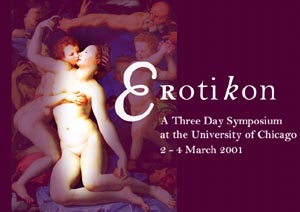Conference will explore evolution of eros
Arthur FournierNews Office
Is there something in the nature of love and erotic desire that is eternal and unchanging, or does eros evolve to reflect the historical and material circumstances of particular cultures?
 |
“Erotikon,” a three-day symposium at the University, from Friday, March 2 through Sunday, March 4, will provide a forum for world-renowned scholars of philosophy, divinity, art history, the classics, film and literature, as well as artists and poets, to enter into a wide-ranging exchange on these and related questions.
The event will include presentations in the form of lectures, poetry readings, a musical performance and a film screening, as well as multiple sessions for debate and discussion.
With more than a few echoes of the original Symposium––Plato’s account of a similar gathering in Athens more than 2,400 years ago––“Erotikon” will take up the Greek concept of eros as a lens through which to explore some of the many facets of love, from ancient times to the contemporary era. But while the discussion in the Symposium was sparked by a complaint that the Greek poets neglected eros, the University’s conference has been organized in response to the grand role that conceptions of love have played in our imaginations since their time.
According to conference organizer Thomas Bartscherer, a graduate student in the Committee on Social Thought, “To borrow a phrase from Luis Buñuel, the conference will be concerned in part with ‘that obscure object of desire.’”
“From Plato’s dialogues, one might surmise that the ultimate object of eros is the beautiful, the good, the true, or perhaps all three,” Bartscherer continued. “The Christian teaching, which derives in part from Neo-Platonic sources, locates the highest expression of love in the God-relationship, while Freud, an heir to both traditions, understands the erotic object primarily in sexual terms.”
Faculty members in the Committee on Social Thought, the Divinity School and the Division of the Humanities who will be presenting papers at “Erotikon” will include Shadi Bartsch, Professor in Classical Languages & Literatures, on eros, philosophy and vision in the early Roman empire; Wendy Doniger, the Mircea Eliade Distinguished Service Professor in the Divinity School, on feminine sexuality in the Kamasutra; Martha Nussbaum, the Ernst Freund Distinguished Service Professor of Law & Ethics in the Law School, on Marcel Proust; Robert Pippin, the Raymond and Martha Hilpert Gruner Distinguished Service Professor in the Committee on Social Thought, on eros in Nietzsche; and David Tracy, the Andrew Thomas Greeley & Grace McNichols Greeley Distinguished Service Professor in the Divinity School, on eros and agape in St. Augustine.
The weekend also will include a performance of works by composer John Eaton, Professor in Music; a screening of Alfred Hitchcock’s Vertigo accompanied by a discussion with Thomas Gunning, Professor in Art History and Cinema and Media Studies; and a slide presentation of photographs by Laura Letinsky, Assistant Professor in the Committee on Visual Arts. Poet Mark Strand, the Andrew MacLeish Distinguished Service Professor in the Committee on Social Thought, will give a poetry reading.
Participants from other institutions will include Leonard Barkan, professor in humanities and English at New York University; Susan Mitchell, poet and professor at Atlantic University of Florida; James Porter, professor in classics and comparative literature at the University of Michigan; and Philippe Roger, professor of literature at École des Hautes Études, Paris.
Bartscherer said that he and co-organizer Katia Mitova, also a graduate student in the Committee on Social Thought, have aimed to facilitate a three-day conversation among all of the participants. “The idea of bringing scholars who take a theoretical approach to artistic expression, aesthetics and literary theory into close contact with artists who evoke eros in their work was central to our plans for the symposium,” he explained. “We’re hoping in part to open up a conversation about the role that art plays in shaping or directing erotic desires,” he continued. In that spirit, Bartsherer and Mitova asked all of the presenters to attend all sessions.
Most lectures, discussions and readings will take place in Swift Lecture Hall on the third floor of Swift Hall, 1025 E. 58th St. “Erotikon” is sponsored by the Committee on Social Thought in association with the Chicago Group on Modern France, the Department of Classical Languages & Literatures, the Department of Music, the Divinity School, the Division of the Humanities, the Division of the Social Sciences, Doc Films, the Franke Institute for the Humanities, the Office of the Provost, and the Society of Fellows in the Liberal Arts. There is no fee, but registration is required. For more information or to register, please visit the “Erotikon” Web site at http://humanities.uchicago.edu/events/erotikon or call the Committee on Social Thought at (773) 702-8427.
![[Chronicle]](/images/small-header.gif)